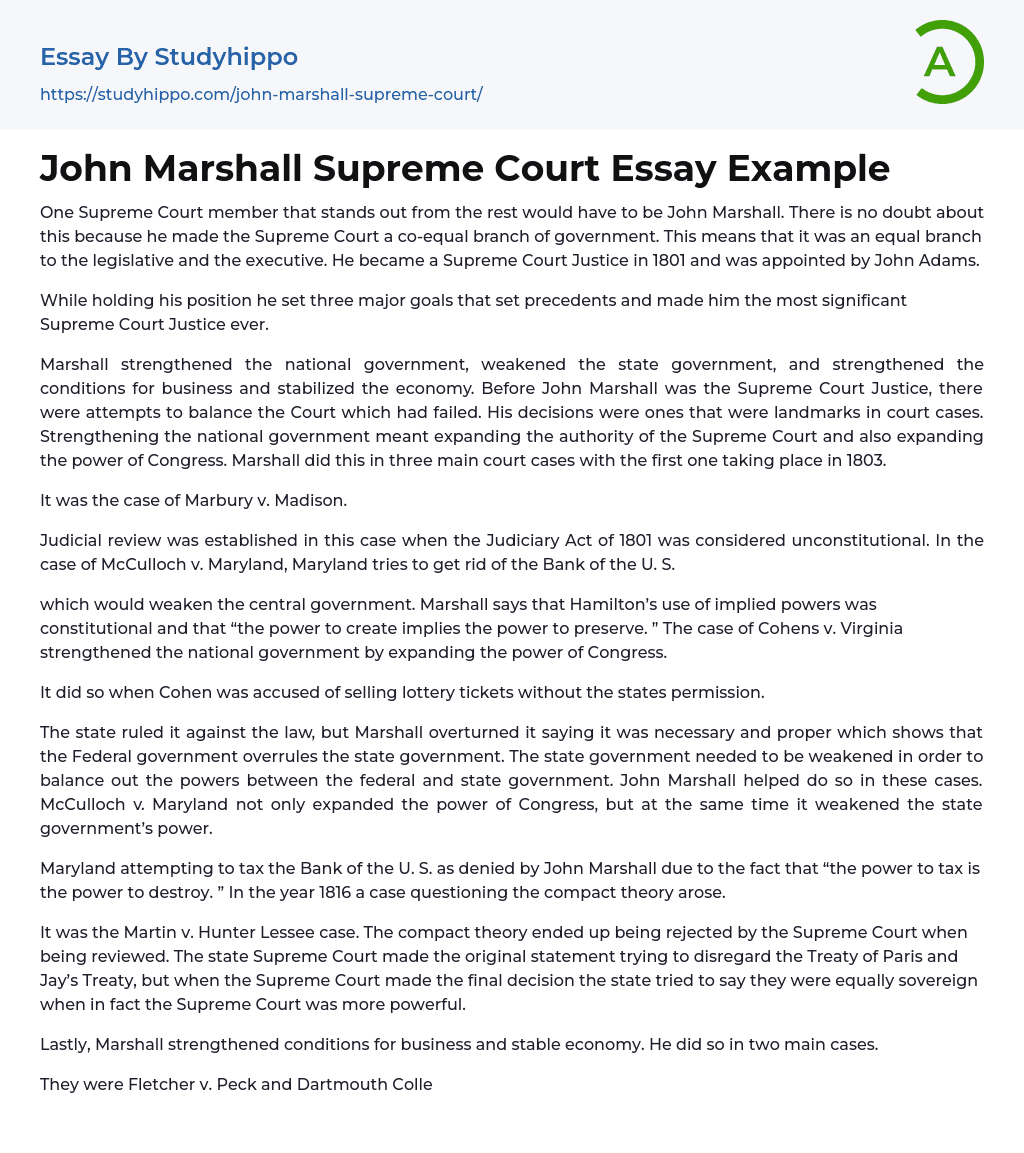One Supreme Court member that stands out from the rest would have to be John Marshall. There is no doubt about this because he made the Supreme Court a co-equal branch of government. This means that it was an equal branch to the legislative and the executive. He became a Supreme Court Justice in 1801 and was appointed by John Adams.
While holding his position he set three major goals that set precedents and made him the most significant Supreme Court Justice ever.
Marshall strengthened the national government, weakened the state government, and strengthened the conditions for business and stabilized the economy. Before John Marshall was the Supreme Court Justice, there were attempts to balance the Court which had failed. His decisions were ones that were landmarks in court cases. Strengthening the national government mean
...t expanding the authority of the Supreme Court and also expanding the power of Congress. Marshall did this in three main court cases with the first one taking place in 1803.
It was the case of Marbury v. Madison.
Judicial review was established in this case when the Judiciary Act of 1801 was considered unconstitutional. In the case of McCulloch v. Maryland, Maryland tries to get rid of the Bank of the U. S.
which would weaken the central government. Marshall says that Hamilton’s use of implied powers was constitutional and that “the power to create implies the power to preserve. ” The case of Cohens v. Virginia strengthened the national government by expanding the power of Congress.
It did so when Cohen was accused of selling lottery tickets without the states permission.
The state ruled it against the law
but Marshall overturned it saying it was necessary and proper which shows that the Federal government overrules the state government. The state government needed to be weakened in order to balance out the powers between the federal and state government. John Marshall helped do so in these cases. McCulloch v. Maryland not only expanded the power of Congress, but at the same time it weakened the state government’s power.
Maryland attempting to tax the Bank of the U. S. as denied by John Marshall due to the fact that “the power to tax is the power to destroy. ” In the year 1816 a case questioning the compact theory arose.
It was the Martin v. Hunter Lessee case. The compact theory ended up being rejected by the Supreme Court when being reviewed. The state Supreme Court made the original statement trying to disregard the Treaty of Paris and Jay’s Treaty, but when the Supreme Court made the final decision the state tried to say they were equally sovereign when in fact the Supreme Court was more powerful.
Lastly, Marshall strengthened conditions for business and stable economy. He did so in two main cases.
They were Fletcher v. Peck and Dartmouth College v. Woodward. In Fletcher v. Peck New Georgia legislature canceled a contract and tried to get back their 35 million acres of land.
According to Marshall, it’s unconstitutional to invalidate contracts because they are a legally binding agreement which strengthens businesses that require a signed contract. The other case was Dartmouth College v. Woodward where a charter that was granted to Dartmouth by New Hampshire.
The charter tried to create a state tuition.
It
was successful because Marshall had previously stated that charters/contracts cannot be invalidated because they are legally binding. In conclusion John Marshall is the most significant Supreme Court Justice to have ever lived. He set many precedents and helped strengthen the national government, weaken the state government, and strengthen condition for businesses and stable economy. Without him the government would not nearly be as smooth running and have the power that it does today.
- Absolutism essays
- Appeal essays
- Bourgeoisie essays
- Contras essays
- Corporate Governance essays
- Corruption essays
- Democracy essays
- Democratic Party essays
- Developed Country essays
- Dictatorship essays
- Elections essays
- European Union essays
- Federalism essays
- Foreign essays
- Foreign policy essays
- Gentrification essays
- Hillary Clinton essays
- Income Tax essays
- International Relations essays
- John Marshall essays
- John Stuart Mill essays
- Left-Wing Politics essays
- Liberty essays
- Military essays
- Monarch essays
- Monarchy essays
- Political Corruption essays
- Political Party essays
- Political Science essays
- President Of The United States essays
- Public Service essays
- Red Cross essays
- Reform essays
- Republic essays
- Revenge essays
- Social Security essays
- Sovereign State essays
- State essays
- Supply essays
- Terrorism essays
- United Nations essays
- World Trade Organization essays
- Supreme Court essays
- Supreme Court Of The United States essays




